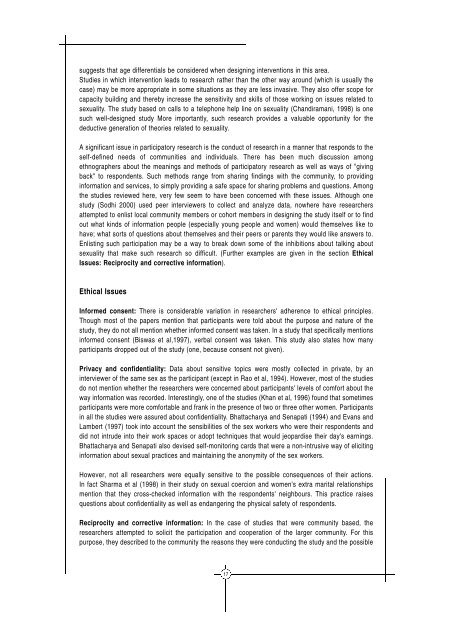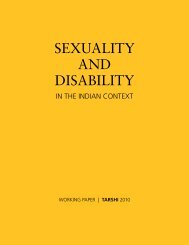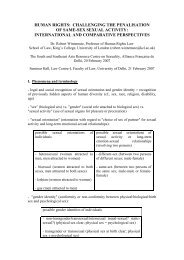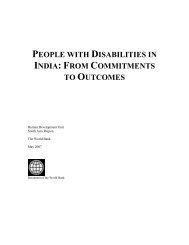FREE Download - TARSHI
FREE Download - TARSHI
FREE Download - TARSHI
Create successful ePaper yourself
Turn your PDF publications into a flip-book with our unique Google optimized e-Paper software.
suggests that age differentials be considered when designing interventions in this area.<br />
Studies in which intervention leads to research rather than the other way around (which is usually the<br />
case) may be more appropriate in some situations as they are less invasive. They also offer scope for<br />
capacity building and thereby increase the sensitivity and skills of those working on issues related to<br />
sexuality. The study based on calls to a telephone help line on sexuality (Chandiramani, 1998) is one<br />
such well-designed study More importantly, such research provides a valuable opportunity for the<br />
deductive generation of theories related to sexuality.<br />
A significant issue in participatory research is the conduct of research in a manner that responds to the<br />
self-defined needs of communities and individuals. There has been much discussion among<br />
ethnographers about the meanings and methods of participatory research as well as ways of "giving<br />
back" to respondents. Such methods range from sharing findings with the community, to providing<br />
information and services, to simply providing a safe space for sharing problems and questions. Among<br />
the studies reviewed here, very few seem to have been concerned with these issues. Although one<br />
study (Sodhi 2000) used peer interviewers to collect and analyze data, nowhere have researchers<br />
attempted to enlist local community members or cohort members in designing the study itself or to find<br />
out what kinds of information people (especially young people and women) would themselves like to<br />
have; what sorts of questions about themselves and their peers or parents they would like answers to.<br />
Enlisting such participation may be a way to break down some of the inhibitions about talking about<br />
sexuality that make such research so difficult. (Further examples are given in the section Ethical<br />
Issues: Reciprocity and corrective information).<br />
Ethical Issues<br />
Informed consent: There is considerable variation in researchers' adherence to ethical principles.<br />
Though most of the papers mention that participants were told about the purpose and nature of the<br />
study, they do not all mention whether informed consent was taken. In a study that specifically mentions<br />
informed consent (Biswas et al,1997), verbal consent was taken. This study also states how many<br />
participants dropped out of the study (one, because consent not given).<br />
Privacy and confidentiality: Data about sensitive topics were mostly collected in private, by an<br />
interviewer of the same sex as the participant (except in Rao et al, 1994). However, most of the studies<br />
do not mention whether the researchers were concerned about participants' levels of comfort about the<br />
way information was recorded. Interestingly, one of the studies (Khan et al, 1996) found that sometimes<br />
participants were more comfortable and frank in the presence of two or three other women. Participants<br />
in all the studies were assured about confidentiality. Bhattacharya and Senapati (1994) and Evans and<br />
Lambert (1997) took into account the sensibilities of the sex workers who were their respondents and<br />
did not intrude into their work spaces or adopt techniques that would jeopardise their day's earnings.<br />
Bhattacharya and Senapati also devised self-monitoring cards that were a non-intrusive way of eliciting<br />
information about sexual practices and maintaining the anonymity of the sex workers.<br />
However, not all researchers were equally sensitive to the possible consequences of their actions.<br />
In fact Sharma et al (1998) in their study on sexual coercion and women's extra marital relationships<br />
mention that they cross-checked information with the respondents' neighbours. This practice raises<br />
questions about confidentiality as well as endangering the physical safety of respondents.<br />
Reciprocity and corrective information: In the case of studies that were community based, the<br />
researchers attempted to solicit the participation and cooperation of the larger community. For this<br />
purpose, they described to the community the reasons they were conducting the study and the possible<br />
17










